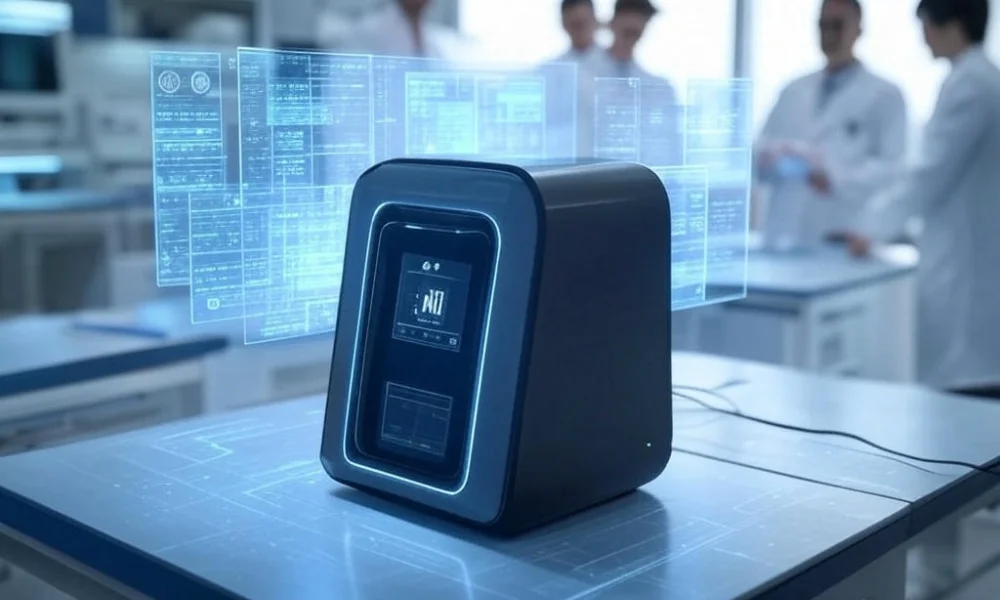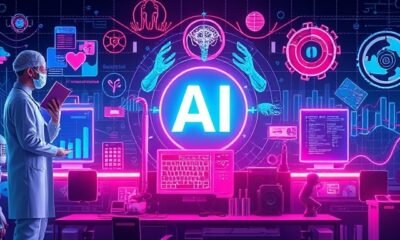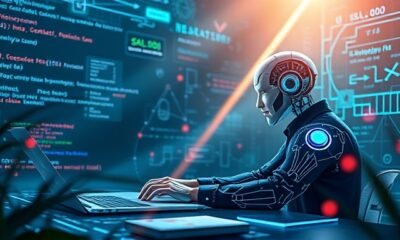Artificial Intelligence
FDA Explores AI for Drug Approvals:
The FDA’s collaboration with OpenAI could revolutionize the drug approval process by using AI to speed up reviews while maintaining safety standards. Find out how this partnership could lead to faster, more affordable treatments.

For a drug to reach the U.S. pharmacy shelves, it can take in excess of a decade from incipient discovery to final sale. It’s never been a pleasant thing, particularly for those patients who wait for year for urgently needed treatments. That wait is not only long but majorly impacts patients’ futures.
Definition:
Drug approval is the systematic process that FDA uses to evaluate to determine whether a new drug is safe and effective.
Collaboration between the FDA and OpenAI aims to use AI to change the pace in which new medicines are available to the patients. Partnering with OpenAI can transform healthcare, making patients benefit from safer medications more promptly. In my opinion, this initiative is a bold step that can give birth to revolution of drug development, evaluation and clearance.
Not only speeding things up is not enough; the idea is to move forward effectively, without compromising safety. The FDA seeks to attain a new equilibrium by applying the efficiency of AI while accompanied by the opinion of human experts.
Why Drug Approvals Take So Long?
- However, when I looked at the big picture, the steps became rational. Obtaining FDA approval for a drug after carrying out some research in a lab is a grueling and tedious process.
- Entire process starts with preclinical experiments in which the researchers check how the drug works in cells and animals. Then, the process proceeds to human trial at Phase I, II and III clinical trials. During every stage, the researchers confirm that the drug is safe and effective, at a suitable dosage and actually works as intended.
- Only at that point after putting this thing through all the trials does the FDA come in for their final approval process. In doing so they closely examine substantial volumes of research information before granting approval. I know their strict standards, and there is a valid reason for it.
- Biggest obstacles are mainly caused by data analysis and the time needed for thorough reading of everything. Reviewing large volumes of clinical trial materials sometimes takes months, and sometimes even years. Analyzing teams look through individual records, outcomes, and test results manually.
- Due to limited ability to sifting through large data, it is a great challenge to humans. I’m certain I would find it difficult to see any patterns from millions of data points. That is exactly what the FDA is forced with as they receive and analyze thousands of drug applications. Restrictive requirements and focus on a safer environment render the process even more prolonged.
- These delays take a toll on patients requiring time to wait for therapies that may save or leverage their health conditions. The wait is especially frustrating for people who are afflicted with rare or deadly diseases.
- A lengthy FDA review not only exposes patients to danger but also hits drug companies’ wallet as day passes. That extra cost very often ends up being borne by the patients and their insurers. I believe we can do better with all the support of better tools.
How Could AI Change the Drug Approval Timeline?
- What hits me first about AI in drug approvals is how much time can be saved. AI can handle the monotonous work that slows down the human reviewers. For example; AI systems can read medical records, and analyze clinical information and discover any issues of safety that can be established.
- The fact is the AI can comprehensively review hundreds of documents within minutes, whereas, it takes months using the manual means. Imagine how much faster it could speed up the review process. I believe it would allow the FDA more time to make measured judgments and make high-stakes decisions rather than being hamstrung by boring paperwork.
- A very interesting thing is that AI can extract patterns in large sets of data. AI systems can better recognize subtle patterns in earlier clinical trials more quickly than a panel of human reviewers. For instance, using AI models a potential of a drug can be estimated matching it to similar substances or historical testing results.
- Another key benefit is automation. I’ve seen AI systems summarize long reports and pull valuable information through asking questions within minutes. That help implies that the FDA may process several cases at the same time without losing safety standards.
- Let’s not forget cost savings. Faster licensing procedures might help save money for people who develop medicines. When drug makers cut back on their spending then the price the patients pay may come down. What the majority want is medication that is cheaper and accessible to them more quickly.
- Such artificial intelligence is not restricted to the acceleration of processes. It enhances accuracy, reduces errors that may be committed by humans and ensures nothing important gets past the filtration stage. Personally, that is the big thing that I think makes AI integration necessary.
How AI Could Transform the Approval Process?
- I’ve been paying close attention to the way AI is being embraced in healthcare and its promise to accelerate drug approvals is interesting. AI is more than just buzzwords; it actually helps in progress on this front. A significant benefit is that this reduces the pressure for clinical data analysis that is largely manual and takes months.
- AI applications allow processing clinical findings, identifying effective, ineffective, or pose safety concerns any substance. This technology can be of paramount benefit to safety reviews. It will be possible for regulators to make judgments rather than being forced to deal with too many paperwork.
- It is AI which is especially good at revealing subtle patterns which a human might overlook. AI is capable of finding patterns that humans would miss if AI was fed with the right information. There is something to consider that the AI may uncover unwanted effects identified in a high volume of clinical trials. I believe this ability may enable regulators to recognize risky drugs earlier.
- AI tools can estimate how effective a new medication can be. By comparing it with thousands of already existing drugs and studies. This way, researchers can use such an approach to guide focusing resources for promising drugs that deserve accelerated review.
- AI can handle most of the documentation and reporting involved which are notorious to be the most time consuming part of the process. Such automatic processes complement human roles, so we can focus on key issues human hands can perform.
- We can now speak about the positive consequences. First, it is possible for AI to greatly decrease drug approval time. Much useful extraction time could be saved, both for the patients as well as the developers, by shortening the approval period cut down from ten to five years. Second, in my view, the overall cost may reduce. The fact that the review cycles are shorter provided for better timely testing reducing the financial load of getting medications to patients.
- The best part? With AI in its arsenal, the FDA would easily be able to handle greater caseload of drug applications without compromising safety oversight. I think this way of doing things would accelerate innovation particularly for rare diseases that are neglected as a matter of fact.
What’s Behind the FDA and OpenAI Partnership?
- First, I came to understand that the FDA’s relationship with OpenAI extended beyond testing new technology. Such a collaboration might entirely transform the drug process review in US. The officials of FDA wonder whether incorporating AI accelerates the process and at the same time maintains safety standards.
- Through reading the news, I found that FDA is initially going to try this out by doing small trials. Pilot projects will focus on such things as condensing drug reports, patterns in clinical trials and speeding up gist review processes. Testing AI in smaller scale projects on its own and before it is implemented in wider use appears reasonable.
- Rather than let AI take over review activities, the objective is to. Instead, the FDA attempts to empower their staff, hence availing AI gadgets that reduce mundane administrative tasks. In my opinion, this strategy operates like a digital friend, helping experts drive their decisions faster and wiser.
- But what implications of ethics and regulations are there? That’s also an essential component that they are addressing as well. FAA and OpenAI are responsible for ensuring that AI applications are traceable, easy to understand, and are protected against vulnerabilities. The reliability of AI conclusions (i.e. the fact that justifications for AI conclusions are based on reliable information, supervised by human beings) is at the very heart of trust-building.
- Another key issue is privacy. As real clinical data will be used, it is important to protect the personal identity of patients. The fact that I have this mechanism right since the very beginning is extremely important for me.
- They have to follow strict regulatory guidelines for these tools to be effective. What that means is presenting evidence that the tools are accurate, reliable, and fair. I believe that OpenAI’s experience with creating safe and compliant AI technologies will be extremely valuable when establishing a proper direction.
What Are the Risks of Using AI in Drug Approvals?
- I am aware of the possibilities of AI, but I understand that there are risks in the mix as well. I immediately asked myself whether AI can rely on enough to control life-changing decisions. That it is important to note that AI is carelessly susceptible to errors at times when its algorithms are formed from outdated or biased information.
- Imagine this scenario where an AI misses out on a rare side effect because the clinical trials didn’t include diverse patients enough. That could have serious consequences. In my opinion, it is crucial to have a very strong human oversight even since the AI will be doing most of the analytical work.
- Another challenge is accountability. What stake is in place regarding accountability if a decision made through AI is incorrect? The FDA? OpenAI? The drug company?
- Additionally, some professionals at a personal level may be skeptical and will resist the incorporation of AI into medical decisions. Some healthcare professionals I’ve spoken to remain loyal to traditional approaches. There is an increasing need from regulators, researchers, and drug manufacturers to have clear validation to rely on AI for critical decisions.
- And what about the public? It is obvious that there are many people who are still skeptical about AI in medicine. Sharing of information takes on significant importance along with actual technology.
- Even pharma companies might resist. Many are paranoid that AI could reveal their trial data loopholes or trigger unforeseen regulatory obstacles. It is never easy to shift to something better.
What Could This Mean for the Future of Healthcare?
- If this FDA/OpenAI collaboration works, it may radically change the way they approve and bring medicines to the U.S. market. From my perspective, such a method would help to optimize approvals, reduce risks, and provide more uniformity, which are crucial changes for our system today.
- With AI, making treatments available sooner, we like you and me stand a chance to receive new medications without waiting for years. Those who are concerned with rare or severe conditions might be the biggest beneficiaries.
- That might encourage regulatory organizations around the world to adopt a similar approach. I believe this cooperation may set a new international default for the introduction of AI in healthcare control. Other governments can follow suit and develop their AI-backed review systems.
- As I just want to draw attention to another aspect to consider,; It is likely this change can even spread beyond drugs. Once regulatory approval of AI in a sector works out well, the FDA could then use similar AI technologies for medical devices, diagnostics or food safety inspections. In the near future I expect that AI in its turn might prove itself useful in drug discovery, disease diagnostics, and food safety.
- A major impact can reach the entire tech sector. If OpenAI proves that large language models work in medicine, then it would open up room for larger AI innovations in health technology. Applications may also include AI for diagnostics, robotic surgery assistance, or a virtual health assistant.
- The U.S. seems to be keen to join the race to be the global leader in AI-enabled healthcare.
- It is more than just inventing new tools; it is to establish a new industry standard. If it goes well, all will benefit in the results.
Conclusion:
If properly interrogated, this collaboration could speed up the medicine delivery, reduce costs, and enhance the quality of drug reviews.
Science fiction has become a daily reality in medical care by means of artificial intelligence. It’s the fact and it is revolutionalising medical care and the way innovations get to market. This change is of concern to the Americans as we will all need treatments that are not yet available. We should focus on clarity in regulations, openness in operations, and strict human guidance at every level. As wisely deployed, this is not just about speeding up medicine approval processes, it is about bringing life saving outcomes.
-

 Artificial Intelligence8 months ago
Artificial Intelligence8 months agoWhat is Artificial Intelligence? A Comprehensive Guide for Businesses and Enthusiasts
-

 Artificial Intelligence6 months ago
Artificial Intelligence6 months agoHow to Use Grok AI: A Complete Guide
-

 Artificial Intelligence8 months ago
Artificial Intelligence8 months agoUnlocking the Power of Artificial Intelligence Tools
-

 Artificial Intelligence7 months ago
Artificial Intelligence7 months agoWhat is DeepSeek? Revolutionizing AI with Cutting-Edge Solutions
-

 Artificial Intelligence3 months ago
Artificial Intelligence3 months agoAI Technologies in Warehouse Automation:
-

 Artificial Intelligence4 months ago
Artificial Intelligence4 months agoMeta’s AI Push: The Standalone Assistant App Set to Rival ChatGPT
-

 Artificial Intelligence3 months ago
Artificial Intelligence3 months agoHow Artificial Intelligence is Revolutionizing Logistics:
-

 Artificial Intelligence3 months ago
Artificial Intelligence3 months agoPredictive Analytics for Demand Forecasting:


